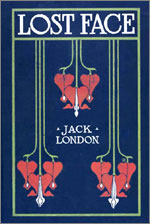| |
Pre-1950s |
| |
The Awakening, Kate Chopin
Black Spring, Henry Miller
Brideshead Revisited, Evelyn Waugh
A Christmas Carol, Charles Dickens
Crime and Punishment, Fyodor Dostoyevsky
Demian, Hermann Hesse
Embers, Sándor Márai
Frankenstein, Or, The Modern Prometheus, Mary Shelley
The Grapes of Wrath, John Steinbeck
The Heart is a Lonely Hunter, Carson McCullers
Howards End, E.M. Forster
The Iceman Cometh, Eugene O’Neill
In Our Time, Ernest Hemingway
The Man with the Golden Arm, Nelson Algren
Metamorphosis, Franz Kafka
The Picture of Dorian Gray, Oscar Wilde
The Poetical Works of John Keats, John Keats
The Sheltering Sky, Paul Bowles
Lost Face, Jack London
Nineteen Eighty-Four, George Orwell
The Poems of Dylan Thomas, Dylan Thomas
To the Lighthouse, Virginia Woolf
Wuthering Heights, Emily Brontë |
|
|
Lost Face, Jack London
Macmillan Co., March, 1910
Throughout the years I have made several pilgrimages to the estate of author Jack London, which is now a California State Park. Whenever I had the chance I would bring family or friends to share my love for this special place. As it happened on this particular visit I was alone. Actually it was the only time I have ever been there by myself. It was a grey October day without tourists. I was wandering around the guesthouse, now a museum, when I discovered a short tape loop of a snippet of a silent home movie made in October 1916 a few weeks before London died. I watched it several times.
Jack London was waving at me and mugging for the camera. He was dying of kidney failure but he looked contented and full of life. It was as if he were trying to communicate across time from the early 20th Century to me in the late 20th Century. To me, standing there alone in his guesthouse, where he lived and wrote and lived out his last days. It was then that I realized that I was watching the film on the same exact date that it had been filmed albeit almost a century later.
The film’s accompanying text informed me that London was just a month or so into his fortieth year when he died. I too had just turned forty while on this very trip to California. I looked at my milestone and saw little accomplishment while he had published at least one novel and countless short stories each year from the time he was 24 until his death at 40.
All of his stories came from his life as an adventurer, explorer, war correspondent, sailor, oyster pirate, and Klondike gold rusher. The last door to the frontier was slamming shut at the turn of the 20th Century and London didn’t want to miss any of it. And through his stories he took me along for the ride.
When I was young I envied his life of adventure, now I envy his story telling skill more. All his work was about life and death and living life to its fullest, all in the context of man’s place in relation to the powerful forces of the natural world. No big themes here. He was the prototype for other great American adventurers—writers like Earnest Hemingway who followed in his footsteps roughly 20 years later.
Read To Build A Fire in this collection of short stories and understand how fragile human existence is in the uncompromising realm of nature. Where no mistake, however small, goes unpunished and survival is mostly a matter of how finely tuned we are to our environment. A lesson our society is just beginning to learn.
I would rather be ashes than dust!
I would rather
that my spark burn out in a brilliant blaze
than it should be stifled by dry rot.
I would rather be a superb meteor,
every atom of me in magnificent glow,
than a sleepy permanent planet.
The proper function of man is to live, not to exist.
I shall not waste my days in trying to prolong them.
I shall use my time.
-Jack London
-RAW

|
|
 |

